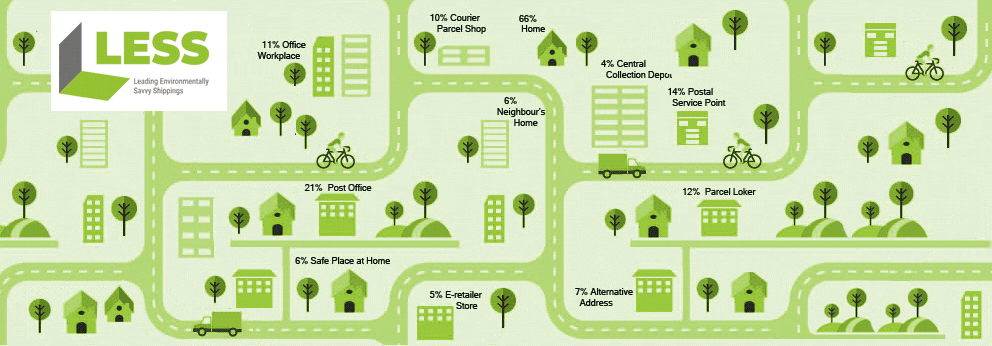eco-friendly e-commerce: “proximity deliveries”
Is today’s e-commerce eco-friendly?
Online sales have almost tripled in the last 10 years and we’ve seen an even more rapid growth during the past year.
People who have never made online purchases before have started doing so, as a result of the new lifestyle imposed by the state of public health emergency.
People, businesses, professionals, and companies have had to reorganize to invent new services, processes, and infrastructures in record time to meet the new demands associated with online shopping, and the organizational and commercial aspects that have been impacted.
But what are the environmental costs of e-commerce?
The demand for frequent parceled out deliveries is heavily affecting the overall urban traffic, creating road congestion, and consequently increasing CO2 emissions.
In city centers, due to the increased number of vehicles used for deliveries, we are witnessing a real challenge in managing traffic and air pollution. Without effective interventions, the situation is expected to become difficult to manage in the next few years.
Today, the environmental theme is one of the top global issues; governments, associations, media, organizations, and companies are dedicating more and more attention, time, and resources on this topic.
The environment has become a priority
We are faced with a very interesting social phenomenon: an increased interest in environmental protection and an increase in online shopping that causes polluting emissions.
One of the key points of intervention, supported by LESS as a non-profit environmental organization, is to make e-commerce efficient and sustainable.
The tool: “proximity deliveries”
The management of e-commerce sales involves many players in the path from order to delivery.
The optimization of logistics and costs also depends on the correctness of the processes to avoid negative returns on the reputation of retailers in terms of price and service.
The “point of proximity”
This is why, with the change in consumer habits, it is necessary to juxtapose the evolving process models related to e-commerce management.
Delivery or collection in a “proximity point” represents one of the preferential methods for configuring a true eco-friendly business model.
The “proximity points” become of utmost importance in reducing CO2 emissions.
Additionally, they leave room for developing initiatives such as order & collect, pick & pay, and click & collect, making it possible to preserve the value of physical stores as fundamental urban services.
The LESS project for proximity deliveries:
LESS provides all the necessary tools to promptly schedule deliveries and collections at proximity points through the use of advanced systems, analysis models, and information flow management.
For example:
- Extract, transform, and load (ETL) for integration with the existing infrastructure
- models based on historical data from the micro-delivery network and PUDO
- models for optimizing vehicle positioning and support points
- real-time programming of daily activities (dynamic tolerances)
The LESS app allows end-to-end communications with recipients, which also allows the user to search for the closest points on a map.
It is possible to choose the date and time for the collection or reschedule.
The technologies and tools of “LESS’ micro-delivery “
The most popular last mile distribution model involves the transport of goods by large trucks to the main warehouses and the subsequent use of delivery trucks for bigger deliveries and vans for smaller deliveries and according to the area.
Management systems often lack forecasting functions for timing, geo-location, and communication, and lack flexibility in terms of transportation and organization on the territory (“road map”).
Therefore, analysis and development of innovative processes become fundamental.
The “genetic programming“
The most effective approaches adopt artificial intelligence techniques called “genetic programming.“
Inspired by biological evolution, these techniques produce a “basic” solution to the problem, which is then made to evolve towards the “optimal” solution.
The starting point is an analysis model that requires action with a series of local micro interventions.
They are based on global forecast models that allow improvements without upsetting the operating methods through options that are subject to revisions and integrations over time.
Dynamic proximity, peak and inventory management, line delay analysis, pooling on disadvantaged areas, agreements on the territory.
The new idea of “LESS last-mile”
The data analyses show, with the growth of e-commerce, an increase in small shipments and the predominant displacement in urban environments in confined limited areas.
The optimal LESS last-mile management model provides a network of delivery systems with different modes of transport: first phase on foot, and later with the aid of human-powered vehicles, or at most electric/assisted vehicles, and to assign the delivery of small items to dedicated delivery messengers.
Although the LESS last-mile model may seem simple, it includes various elements of complexity such as planning the daily lap with extremely advanced tools, e.g. optimization algorithms based on genetic programming, time ratio/travel/overall productivity management, short shift planning (2-4 hours), and flexible working hours.
LESS last-mile model
The LESS last-mile model allows a relevant impact in environmental terms while being economically sustainable.
Another benefit of the LESS last-mile model is social. Categories of workers who are unlikely to have a career are involved – non-working parents who can carve out a few hours when the children are at school, people with moderate mental disabilities, and other socially disadvantaged people.

